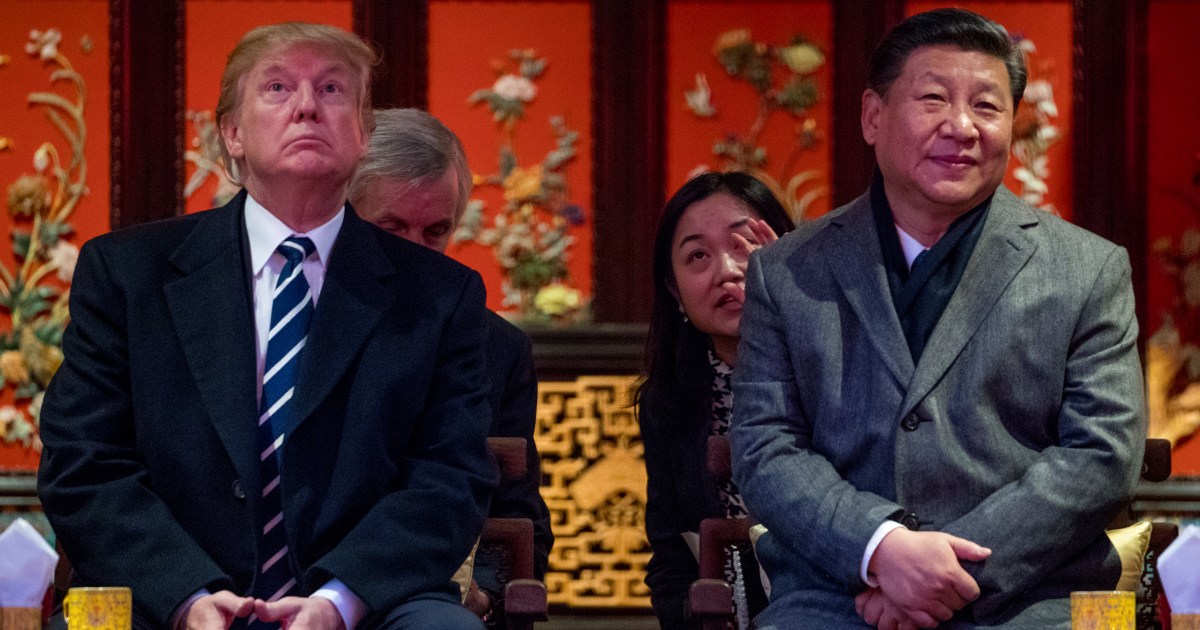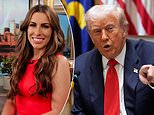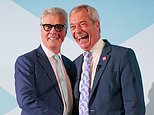
Taipei, Taiwan – United States President-elect Donald Trump is filling his incoming administration with figures known for their hawkish views on China, signalling a tough line on Beijing in areas ranging from national security to trade.
Trump on Tuesday nominated former Director of National Intelligence John Ratcliffe to head the CIA, FOX News host and army veteran Pete Hegseth as secretary of defence, and Florida Congressman Michael Waltz as national security adviser.
On Monday, the president-elect named Elise Stefanik, a congresswoman who holds a House of Representatives seat for New York, as his pick for United Nations ambassador.
Florida Senator Marco Rubio, meanwhile, is widely expected to be tapped for secretary of state.
All five are known for viewing the US and China as being locked in a Manichean struggle for power and advocating a hard line towards Beijing.
Trump on Tuesday also named Tesla and SpaceX CEO Elon Musk and biotech entrepreneur Vivek Ramaswamy to lead a “Department of Government Efficiency.”
Unlike other figures in Trump’s cabinet, Musk, who has significant business ties to China, is known for his relatively positive views about the Chinese government.

Other notable China hawks floated as candidates to join Trump’s administration include former Ambassador to Germany Richard Grenell, Tennessee Senator Bill Hagerty and former US Trade Representative Robert Lighthizer.
On Tuesday, The Wall Street Journal, citing people familiar with the matter, reported that Trump plans to name Lighthizer his “trade czar”.
Lighthizer played an instrumental role in Trump’s trade war during his first term in office, helping to craft tariffs on $380bn worth of Chinese goods.
He could play a similar role again if Trump chooses to make good on his campaign pledge of imposing tariffs of 60 percent or more on Chinese goods and a 10-20 percent tariff on all other imports.
In his book No Trade is Free: Changing Course, Taking on China, and Helping America’s Workers, Lighthizer called for further “decoupling” from China by limiting trade, including exports of critical technology.
In a recent op-ed for The Financial Times, he accused other countries of “adopting industrial policies that are designed not to raise their standard of living, but to increase exports in order both to accumulate assets abroad and to establish their advantage in leading-edge industries”.
“These are not the market forces of Smith and Ricardo. These are beggar thy neighbour policies that were condemned early in the last century,” Lighthizer wrote, referring to the famed British economists Adam Smith and David Ricardo.
Trump’s proposed tariffs would not only affect China but reverberate throughout Asia due to the region’s close links to the world’s second-largest economy.
Analysts at the London School of Economics and Political Science have estimated that Trump’s proposed tariffs would result in a 0.68 percent reduction in China’s gross domestic product (GDP), with neighbours India and Indonesia facing smaller losses of 0.03 percent and 0.06 percent, respectively.
Trump’s return to the White House also comes amid rising tensions between China and self-governing Taiwan, which Beijing claims as its territory.
US Admiral Philip Davidson, the former chief of the US Indo-Pacific Command, has estimated that China’s army will have the capability to invade the island by 2027, which falls within Trump’s term.
Against this backdrop, many of Trump’s top picks look set to put Washington on the path to confrontation with Beijing.

If confirmed as Washington’s top diplomat, Rubio would be the first sitting secretary of state to have been sanctioned by Beijing.
As the vice chairman of the Senate Select Committee on Intelligence and a senior member of the Senate Committee on Foreign Relations, Rubio is known as a strident critic of the Chinese government.
Rubio was banned from China in 2020 over comments he made about the treatment of ethnic minorities in Xinjiang province, and was on a list of 11 US officials who were sanctioned in retaliation for US sanctions targeting Beijing’s crackdown on dissent in Hong Kong.
In the lead-up to his re-election in the 2022 midterm elections, he was singled out as a target of Chinese influence operations, according to an October report by the Microsoft Threat Analysis Center.
Rubio is also known as a prominent supporter of Taiwan, a stance he is expected to maintain as the US’s top diplomat, according to analysts.
“It’s hard to imagine Marco Rubio supporting a US turnaway from Taiwan. It’s very hard to imagine Marco Rubio presiding over a détente between the US and China, and it’s also very hard to imagine him supporting a détente in which US commitment to democratic values is put on the back burner,” Bethany Allen, head of China Investigations and Analysis at the Australian Strategic Policy Institute, told Al Jazeera.
As the head of the top US spy agency, Ratcliffe, who served as Trump’s director of national intelligence, is likely to prioritise the alleged security threat posed by China.
In a 2020 op-ed for The Wall Street Journal, the former Texas congressman described the superpower as the “greatest threat to America today, and the greatest threat to democracy and freedom worldwide since World War II”.
While the Soviet Union and counterterrorism consumed the attention of US intelligence agencies in the past, Ratcliffe wrote, the current circumstances “make plain that China should be America’s primary national security focus going forward”.
Hegseth, Trump’s pick for defence chief, has voiced similar sentiments about the scale of the Chinese threat.
The Army National Guard veteran, an unusual choice since he is neither a retired general nor a former government official with high-level national security experience, has staked out a hardline stance on China in media appearances.
During an appearance on the Shawn Ryan Show on YouTube earlier this month, Hegseth claimed that China was “building an army specifically dedicated to defeating the United States of America”, as well as using its dominance in tech and manufacturing to amass global influence.
Hegseth said China aimed to take over Taiwan to gain control of its semiconductor industry, which produces the lion’s share of the global supply of advanced chips.
“They have a full-spectrum long-term view of not just regional but global domination … The only way they can implement a structure that can serve them is by defeating us,” he said. “They are ambitious enough to put in a plan to do it.”
Fellow veteran Waltz, a retired Green Beret who served in Afghanistan and Africa, has called China an “existential threat”, while Trump described him as “an expert on the threats posed by China, Russia, Iran, and global terrorism”.
In his book Hard Truths: Think and Lead Like a Green Beret, Waltz argued that the US needed to improve its military preparedness for a possible conflict with Beijing.
He has also publicly called on Taiwan to ramp up its defence spending, which is due to hit 2.45 percent of gross domestic product (GDP) in 2025.
“We must learn from Ukraine by addressing the threat of the CCP [Chinese Communist Party] and arming Taiwan NOW before it’s too late. That’s why I asked State & DoD [Department of Defense] officials for a timeline and specifics on how we plan to bolster Taiwan’s self-defence capabilities,” he said in a post on X last year.
His comments echo remarks made by Trump, who said on the campaign trail that Taiwanese defence spending should be as high as 10 percent of GDP.
“Waltz is an ardent China hawk and has emphasised the importance of defending Taiwan,” Benjamin A Engel, a visiting professor at Dankook University in South Korea, told Al Jazeera.
“He seems to believe strengthening alliances is important in facing down China and has been a strong advocate of improving relations with India for such a purpose.”
Trump’s picks will be “somewhat welcome news” for allies such as Japan and South Korea, Engel said, “but not so attractive to many states in Southeast Asia who would prefer not to make a clear choice between the two great powers”.

Among these hawks, Musk stands out as one of the few China-friendly figures in Trump’s orbit.
As CEO of Tesla, Musk has extensive business interests in China, including a gigafactory in Shanghai. China is also Tesla’s second-largest market after the US.
As such, he could resist further US “decoupling” from China.
Musk has received criticism from human rights advocates and US legislators, including Rubio, for his business dealings with China, including his decision in 2022 to open a showroom in Xinjiang, where Beijing is accused of perpetrating human rights abuses against ethnic minority Uighurs.
The tech mogul has met with top Chinese officials on numerous occasions, including meetings with then-Foreign Minister Qin Gang in 2023 and Premier Li Qiang – China’s No 2 official – this April.
Some of Musk’s reported comments on China stand in stark contrast to the hawkish views of other members of Trump’s inner circle.
According to Walter Isaacson’s 2023 biography of Musk, the billionaire reportedly told journalist Bari Weiss that there were “two sides” to China’s treatment of the Uighurs and that his social media platform X would “have to be careful about the words it used regarding China, because Tesla’s business could be threatened”.
In a 2022 interview with The Financial Times, Musk prompted controversy by suggesting that Taiwan become a “special administrative zone” of China like Hong Kong and Macau.
“My recommendation… would be to figure out a special administrative zone for Taiwan that is reasonably palatable, probably won’t make everyone happy. And it’s possible, and I think probably, in fact, that they could have an arrangement that’s more lenient than Hong Kong,” he said.
He doubled down on the remarks during an appearance at the All-In tech summit in Los Angeles later that year, saying Taiwan was an “integral” part of China that would not exist without the assistance of the US Pacific Fleet.
Some of Washington’s Asian allies may be displeased about Trump’s choice of Stefanik as UN ambassador, said Ian Chong, an assistant professor of political science at the National University of Singapore.
Stefanik has accused the CCP of “blatant and malicious election interference” and infiltrating university campuses, as well as calling for a “complete reassessment” of US funding for the UN due to the body’s criticism of Israel’s war in Gaza.
Chong said while Stefanik fits with Trump’s “America first” ideology, she could lead to friction with US allies who continue to support the UN.
He also cautioned that Trump’s picks may not last the duration of his four-year term given his unpredictability as a leader.
Trump’s first administration was known for its high turnover, with the former president cycling through three chiefs of staff, three secretaries of homeland security, and two defence chiefs.
“Even if you have someone like Rubio, how much he can do in terms of working with Taiwan, or in fact with the other East Asian allies of the United States, might be somewhat curtailed,” Chong told Al Jazeera.
“We also know from the previous administration that Trump has a habit of cycling through his officials quite quickly.
“We have to keep an eye out for who might be in the second, third or fourth rounds, and how long the current appointee stays,” Chong added.
“Even if we know what the lineup looks like going into January, there is still a degree of uncertainty that this is the way Trump runs things.”







